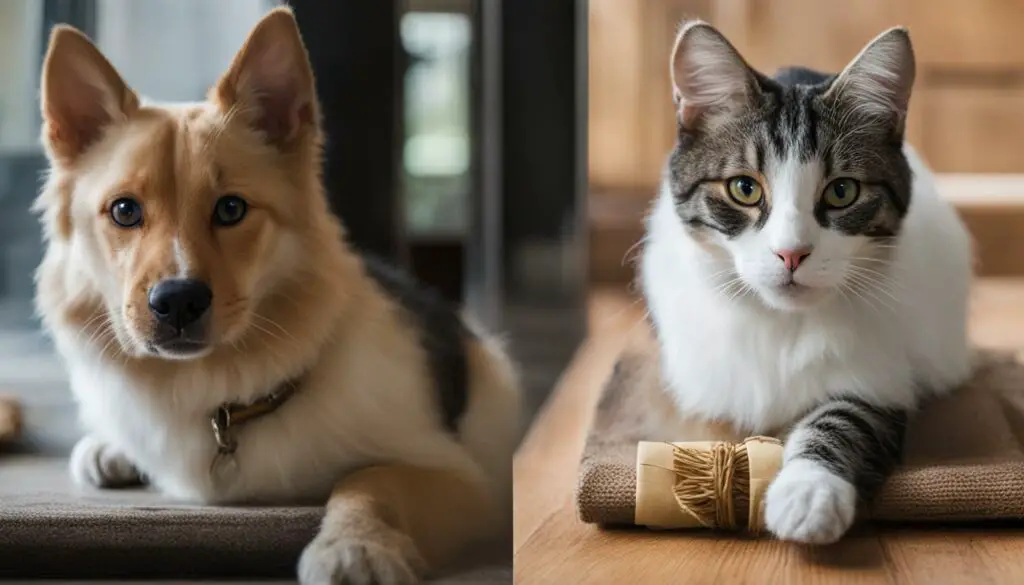When it comes to choosing a pet, many factors come into play, and one of the most significant considerations is the financial aspect. If you’re wondering whether cats are cheaper than dogs, let’s dive into the numbers and uncover the truth. Understanding the cost of owning a cat versus a dog can help you make an informed decision that aligns with your budget and lifestyle.
Key Takeaways:
- On average, cats have lower upfront costs compared to dogs.
- The recurring annual expenses for owning a cat are generally less than owning a dog.
- Over their lifetime, cats tend to be more affordable than dogs in terms of overall expenses.
- Factors such as breed, location, and specific needs can influence the cost of owning a pet.
- While financial considerations are crucial, it’s essential to also consider the emotional benefits of pet ownership when making a decision.
The Upfront Costs of Owning a Cat or Dog
When considering the costs of owning a cat or a dog, it’s essential to understand the upfront expenses involved. These costs include adoption fees, veterinary services, and the necessary accessories for your new furry friend.
Adoption fees can vary depending on the organization and location, but generally, the cost of adopting a cat ranges from $125 to $635, while adopting a dog can range from $197 to $1,090. These fees often include initial vaccinations and spaying/neutering procedures.
Veterinary services are another important factor to consider. Cats and dogs both require regular check-ups, vaccinations, and preventive care. The cost of these services can vary depending on the size, breed, and specific needs of your pet. It’s recommended to budget around $125 to $400 for initial veterinary expenses.
Veterinary Expenses Breakdown
| Expense | Cost Range (Cat) | Cost Range (Dog) |
|---|---|---|
| Initial vaccinations | $75 – $100 | $75 – $100 |
| Spaying/Neutering | $200 – $500 | $200 – $500 |
| Microchipping | $45 – $75 | $45 – $75 |
| Deworming | $25 – $50 | $25 – $50 |
| Routine check-ups | $50 – $100 | $75 – $150 |
Lastly, you’ll need to purchase essential accessories for your pet. These include items such as food bowls, a bed, a leash and collar, a litter box and litter for cats, and toys to keep them entertained. Depending on your preferences and the quality of the products, these costs can range from $75 to $200.
It’s important to keep in mind that these upfront costs can vary based on factors such as the breed, age, and health condition of the pet, as well as regional differences in prices. By budgeting for these expenses and researching available options, you can ensure a smooth transition into pet ownership while managing the costs effectively.

The Recurring Annual Costs of Owning a Cat or Dog
When considering the financial implications of owning a pet, it’s important to take into account the recurring annual costs. These costs include vet visits, food, boarding, toys, and grooming. The expenses can vary depending on the size, breed, and specific needs of the pet.
For cat owners, the estimated annual costs range around $1,125. This includes regular vet check-ups, vaccinations, preventive medications, and high-quality cat food. Grooming expenses for cats are generally lower as they tend to be self-grooming animals. Additionally, cats are less likely to require boarding services, which can further reduce annual costs.
On the other hand, dog owners can expect to spend approximately $1,641 per year on their furry friends. Dogs usually require annual vaccinations, regular vet check-ups, preventive medications, and higher quantities of food compared to cats. Additionally, certain breeds may require more frequent grooming, which can add to the overall expenses. Dog owners may also need to budget for boarding services if they travel frequently.

| Cats | Dogs | |
|---|---|---|
| Vet Visits | $500 | $800 |
| Food | $400 | $800 |
| Boarding | $0 | $400 |
| Toys | $100 | $200 |
| Grooming | $125 | $500 |
| Total | $1,125 | $1,641 |
While the recurring annual costs for owning a pet can add up, it’s important to remember that the joy and companionship they provide are often priceless. By budgeting for these expenses and considering ways to save, such as seeking out discounts or investing in pet insurance, pet ownership can remain affordable and fulfilling.
The Lifetime Cost of Owning a Cat or Dog
When considering the financial implications of owning a pet, it’s important to take into account the lifetime cost of ownership. This includes not only the initial upfront expenses but also the recurring annual costs over the pet’s lifespan. In this section, we will compare the lifetime costs of owning a cat versus a dog and explore the factors that contribute to these expenses.
On average, cats tend to live longer than dogs. The average lifespan of a cat is around 15 years, while dogs have an average lifespan of 10 to 13 years. This longer lifespan is one of the factors that make cats more affordable in the long run. While the upfront costs of owning a cat may be lower, it is the lower lifetime costs that truly make a difference.
| Cat | Dog | |
|---|---|---|
| Lifetime Cost Range | $13,625 to $17,510 | $16,607 to $22,423 |
According to a study, the lifetime costs of owning a cat range from $13,625 to $17,510, while the lifetime costs of owning a dog range from $16,607 to $22,423. These costs include not only veterinary care but also food, grooming, toys, and other necessary expenses. While the lifetime costs for both cats and dogs can vary depending on various factors such as breed, size, and specific needs, the overall trend is that cats are more affordable over their lifetime.
It’s important to note that the costs mentioned here are estimates and can vary depending on individual circumstances. Factors such as location, breed, and the specific needs of your pet can all impact the overall cost of ownership. However, when considering the financial aspect of owning a pet, it is clear that cats tend to be the more cost-effective choice in the long run.

Table: Lifetime Cost of Owning a Cat or Dog
- The lifetime cost of owning a cat ranges from $13,625 to $17,510.
- The lifetime cost of owning a dog ranges from $16,607 to $22,423.
It’s important to remember that while the financial aspect is significant, the decision to get a pet should also be based on personal preferences, lifestyle factors, and the emotional benefits that both cats and dogs bring. The companionship, love, and joy that a pet can provide are priceless and should also be taken into consideration when making the choice between a cat and a dog.
Factors Affecting the Cost of Owning a Pet
When it comes to owning a pet, several factors can impact the overall cost. These factors include the breed of the pet, location, size, and specific needs. Let’s take a closer look at each of these factors:
Breed
The breed of the pet can have a significant impact on the cost of ownership. Certain breeds may require specialized care, have a higher risk of medical issues, or have specific dietary needs. These factors can result in higher veterinary expenses, specialized food purchases, or the need for additional grooming services.
Location
Where you live can also influence the cost of owning a pet. Veterinary costs, pet supplies, and even pet-friendly accommodations can vary depending on the area. For example, living in a major city may mean higher veterinary fees and potentially higher pet insurance premiums. On the other hand, rural areas may have limited access to certain pet services and supplies, which could impact costs as well.
Size
The size of the pet can impact both upfront and recurring costs. Larger breeds may require larger amounts of food, which can increase monthly expenses. Additionally, larger dogs may need more space or certain accommodations, such as a larger bed or carrier. It’s important to consider these factors when budgeting for a pet.
Specific Needs
Finally, the specific needs of a pet can greatly affect the overall cost of ownership. Some pets may have pre-existing medical conditions that require ongoing treatment or medication. Others may have dietary restrictions that necessitate specialized food purchases. It’s essential to consider these individual needs and factor them into your budget when deciding on a pet.
By taking into account these factors affecting the cost of owning a pet, you can better prepare yourself for the financial responsibilities that come with pet ownership. Understanding and budgeting for these potential expenses will ensure that you can provide the best care for your furry companion while maintaining your financial well-being.
The Financial Benefits of Owning a Cat
When considering the financial aspects of pet ownership, owning a cat can provide a range of benefits that make them an affordable choice. Cats generally have lower upfront costs compared to dogs, making them a more budget-friendly option for those looking to bring a furry companion into their home. Additionally, the recurring annual costs of owning a cat are typically lower, allowing for long-term savings.
One of the main financial advantages of owning a cat is the lower upfront costs. Adoption fees for cats are often lower than those for dogs, and there are often discounts available for spaying/neutering and vaccinations. By taking advantage of these savings, cat owners can significantly reduce their initial expenses. Furthermore, cat accessories such as litter boxes, scratching posts, and toys are generally more affordable compared to dog accessories.
Not only do cat owners save on the initial costs, but they also benefit from lower recurring expenses. Cats typically require less food compared to dogs, resulting in lower monthly expenses. Additionally, veterinary care for cats is generally less expensive, as cats are smaller and have different medical needs compared to dogs. Grooming costs are also typically lower for cats, as they are generally better at self-maintenance.
| Upfront Costs | Recurring Annual Costs | Lifetime Costs | |
|---|---|---|---|
| Cats | $125 – $635 | $1,125 | $13,625 – $17,510 |
| Dogs | $197 – $1,090 | $1,641 | $16,607 – $22,423 |
Overall, owning a cat can offer significant financial benefits. With lower upfront costs, lower recurring annual costs, and more affordable lifetime expenses, cats provide an affordable pet option for individuals and families. However, it’s important to remember that the financial aspect is just one factor to consider when deciding to bring a pet into your life. Personal preferences, lifestyle, and the emotional benefits of pet ownership should also be taken into account.

The Expenses of Owning a Dog
Owning a dog comes with higher upfront and recurring costs compared to owning a cat. Let’s take a closer look at the various expenses involved:
Veterinary Costs
Dogs require regular veterinary visits for vaccinations, check-ups, and preventive care. These visits can add up, especially if your dog requires any specialized treatments or medications. According to the American Pet Products Association, the average annual veterinary expenditure for a dog is $235.
Training and Grooming
Training and socialization are essential for dogs, especially puppies. Puppy training classes and professional dog trainers can be costly. Additionally, grooming expenses such as regular brushing, nail trims, and professional grooming services can contribute to the overall costs of owning a dog.
Food and Supplies
Dogs, especially larger breeds, have higher food requirements compared to cats. The cost of dog food can vary based on the brand, quality, and size of your dog. Additionally, you’ll need to budget for supplies such as leashes, collars, bowls, crates, and bedding.
Additional Expenses
Other expenses to consider when owning a dog include dog walking or pet sitting services, pet insurance, and potential boarding or daycare costs. These additional expenses can further increase the overall cost of dog ownership.
Table: Comparison of Dog Ownership Expenses
| Expense | Average Annual Cost |
|---|---|
| Veterinary Costs | $235 |
| Training and Grooming | Varies based on services needed |
| Food | Varies based on size and brand |
| Supplies | Varies based on individual needs |
| Additional Expenses | Varies based on services required |
As seen from the table above, the total expenses of owning a dog can vary significantly based on individual factors such as breed, size, and specific needs. It’s important to carefully consider these costs and budget accordingly to ensure that you can provide the necessary care and support for your furry friend.

Factors to Consider When Choosing Between a Cat and a Dog
When deciding between a cat and a dog, there are several factors to consider. It’s important to think about your lifestyle, available space, and the time commitment required for each pet.
1. Lifestyle
Consider your daily routine and activity level. Cats are generally more independent and require less exercise compared to dogs. If you have a busy lifestyle or work long hours, a cat may be a better fit as they are more self-sufficient. On the other hand, if you enjoy outdoor activities and want a companion for hikes or runs, a dog may be the right choice for you.
2. Space
Take into account the size of your living space. Cats are typically more adaptable to smaller living environments, such as apartments or condos. They can satisfy their exercise needs indoors and generally require less space compared to dogs. Dogs, especially larger breeds, may need a yard or access to a nearby park for daily exercise and playtime.
3. Time Commitment
Think about the amount of time you can dedicate to your pet. Dogs generally require more attention and socialization. They need daily walks, training, and mental stimulation. Cats, on the other hand, are more independent and can be left alone for longer periods of time. They still need playtime and interaction, but their needs may be less demanding compared to dogs.
By considering these factors, you can make an informed decision that aligns with your lifestyle and preferences. Keep in mind that both cats and dogs can bring joy, companionship, and love into your life, so it’s important to choose the pet that best suits your individual circumstances.
The Emotional Benefits of Owning a Pet
Owning a pet goes beyond the financial considerations; it also brings a multitude of emotional benefits. Whether you choose a cat or a dog, both provide companionship, reduce stress levels, and improve mental health. The bond between a pet and their owner can be incredibly strong, offering unconditional love and support. In fact, numerous studies have shown that pet owners experience increased levels of happiness, reduced feelings of loneliness, and improved overall well-being.

Companionship is one of the key emotional benefits of pet ownership. Cats and dogs offer unconditional love and constant companionship, providing a sense of purpose and a source of comfort. They become part of the family, offering their presence and affection, which can greatly enhance a person’s emotional well-being. Whether it’s the joy of playing with a cat or the loyalty and protection of a dog, having a pet by your side can make a significant difference in your life.
“The love and companionship of a pet can be a lifeline for many individuals, especially those experiencing stress, anxiety, or depression. Pets offer a non-judgmental presence and unconditional love, which can provide a tremendous source of emotional support.” – Dr. Jane Foster, Pet Psychologist
Studies have also shown that owning a pet can help reduce stress levels and improve mental health. The presence of a cat or a dog can have a calming effect, lowering blood pressure and reducing anxiety. Interacting with pets can release endorphins, the feel-good hormones, which can boost mood and alleviate symptoms of depression. Additionally, the responsibilities that come with pet ownership, such as feeding, grooming, and playtime, can provide structure and a sense of purpose, promoting a healthier mindset.
- Decreases feelings of loneliness: Pets provide constant companionship, making individuals feel less alone.
- Boosts mood and happiness: Interacting with pets releases endorphins, improving overall well-being.
- Reduces stress and anxiety: The presence of a pet has a calming effect, lowering blood pressure and promoting relaxation.
- Provides emotional support: Pets offer unconditional love and support, serving as a source of comfort in difficult times.
In summary, owning a pet comes with a myriad of emotional benefits. The companionship, stress reduction, and improved mental health that pets provide make them an invaluable addition to our lives. Whether it’s the playful nature of a cat or the loyal companionship of a dog, pets have the power to bring joy, comfort, and emotional well-being to their owners. So, if you’re considering adding a furry friend to your family, remember that their impact on your emotional health goes far beyond the financial aspects.
Tips for Saving Money on Pet Expenses
When it comes to owning a pet, there are ways to save money without compromising on the care and well-being of your furry friend. Here are some tips for cutting down on pet expenses:
- Budgeting: Create a monthly budget specifically for your pet-related expenses. This will help you track your spending and identify areas where you can save.
- Seeking Discounts: Look for discounts and deals on pet supplies, such as food, toys, and grooming services. Many stores offer loyalty programs or coupons that can help you save money.
- Pet Insurance: Consider investing in pet insurance. While it may have a monthly premium, it can provide financial protection in case of unexpected medical expenses, potentially saving you thousands of dollars in the long run.
- Comparison Shopping: Don’t be afraid to shop around for the best prices on pet supplies and services. Different stores and providers may offer varying prices, so take the time to compare before making a purchase.
Remember, saving money on pet expenses doesn’t mean compromising your pet’s well-being. Prioritize their health and happiness while still being mindful of your budget.
“Saving money on pet expenses is all about being proactive and resourceful. By budgeting, seeking discounts, considering pet insurance, and comparison shopping, you can provide the best care for your pet without breaking the bank.” – Anonymous
By implementing these tips, you can create a balanced approach to pet ownership that is both financially responsible and fulfilling for both you and your furry companion.
Owning a Dog: The Whisker-Thin Verdict
When it comes to the benefits of dog ownership, it’s not just about the financial considerations. Dogs offer a range of unique advantages that can enhance your life in more ways than one. One of the primary benefits is the opportunity for outdoor activities. Owning a dog encourages you to get outside and engage in physical exercise, whether it’s going for a daily walk, playing fetch in the park, or exploring nature trails. These activities promote a healthy and active lifestyle, benefiting both your physical and mental well-being.
Another advantage of owning a dog is the social connections it brings. Walking your furry friend in the neighborhood or visiting the dog park provides opportunities to meet other dog owners. These shared experiences can lead to new friendships and a sense of community. Dog ownership can also foster social interactions with strangers who are drawn to your four-legged companion. Dogs have a way of breaking the ice and sparking conversations, making it easier to connect with others.
“Dogs have a way of breaking the ice and sparking conversations, making it easier to connect with others.”
While dogs may come with higher expenses compared to cats, the intangible benefits they offer can make them a worthwhile choice. The joy, companionship, and love that dogs bring into our lives are priceless. And for many dog owners, these emotional rewards far outweigh any financial considerations. So, if you’re looking for a pet that will keep you active, help you forge new friendships, and fill your life with unconditional love, owning a dog may be the perfect choice for you.

The Benefits of Dog Ownership:
| Benefits | Explanation |
|---|---|
| Outdoor activities | Owning a dog encourages physical exercise and an active lifestyle. |
| Social connections | Walking a dog provides opportunities to meet other dog owners and engage in conversations with strangers. |
| Unconditional love | Dogs offer companionship, joy, and love that can greatly improve your emotional well-being. |
Owning a Cat: The Cost-Effective Choice
When it comes to choosing a pet, the financial aspect is just one of the many factors to consider. However, if you’re looking for a pet that offers both companionship and lower costs, owning a cat can be a cost-effective choice. Cats generally have lower upfront and recurring expenses compared to dogs, making them a more budget-friendly option.
One of the primary benefits of owning a cat is the lower upfront costs. Adopting a cat from a shelter or rescue organization can help save on adoption fees, which are typically lower than those for dogs. Additionally, the initial expenses for accessories like litter boxes, scratching posts, and toys tend to be more affordable for cats. By taking advantage of discounted veterinary services and purchasing in bulk, cat owners can further reduce their upfront expenses.
In terms of recurring annual costs, cats also have an advantage. While both cats and dogs require regular veterinary check-ups, vaccinations, and preventive medications, cat owners can expect to spend less on these expenses. Cats generally require less food and tend to have fewer grooming needs compared to dogs, resulting in lower recurring costs. By diligently budgeting and seeking out cost-saving options, cat owners can ensure that the financial impact of pet ownership remains manageable.
The Emotional Benefits of Cat Ownership
“Living with a cat brings so much joy and companionship into my life. Their gentle purring and playful antics never fail to brighten my day. Plus, the calming effect of stroking a cat can significantly reduce stress levels. Owning a cat is truly rewarding, not just financially, but also emotionally.” – Cat Owner, Sarah Williams
While the lower costs make owning a cat an appealing choice, it’s important to consider the emotional benefits as well. Cats offer companionship, love, and a sense of comfort. Their independent nature allows them to provide affection and companionship on their terms, making them suitable for individuals or families with varying schedules or lifestyles. Research has shown that cat ownership can help reduce stress, improve mental health, and provide a sense of purpose and fulfillment.
In summary, owning a cat is a cost-effective choice that offers both financial savings and emotional rewards. With lower upfront and recurring costs, cats make for affordable companions without compromising on the love and joy they bring into our lives.

Conclusion
After considering the costs associated with owning a cat versus owning a dog, it is evident that cats tend to be the more affordable option. The upfront costs for cats are generally lower, as are the recurring annual expenses. In the long run, the lifetime costs of owning a cat are also more economical compared to those of owning a dog.
However, when deciding between a cat and a dog, it is essential to take into account personal preferences and lifestyle factors. While cats may be more cost-effective, dogs offer unique benefits such as encouraging outdoor activities and fostering social connections with other dog owners in the community.
In conclusion, the decision to get a pet should be based not only on financial considerations but also on the emotional benefits and companionship they provide. Whether you choose a cat or a dog, it is essential to find a pet that aligns with your lifestyle and brings you joy and fulfillment. Ultimately, the choice between a cat and a dog is a personal preference that should be carefully considered based on your individual circumstances.
FAQ
Are cats cheaper than dogs?
Yes, according to a study by MagnifyMoney, the upfront costs, recurring annual costs, and lifetime costs of owning a cat are generally lower compared to owning a dog.
What are the upfront costs of owning a cat or dog?
The upfront costs include adoption fees, accessories like leashes and food dishes, and veterinary services like spaying/neutering and vaccinations.
What are the recurring annual costs of owning a cat or dog?
The recurring annual costs include vet visits, food, boarding, toys, and grooming.
What is the lifetime cost of owning a cat or dog?
The lifetime costs of owning a cat range from $13,625 to $17,510, while the lifetime costs of owning a dog range from $16,607 to $22,423.
What factors affect the cost of owning a pet?
The breed, location, size, and specific needs of the pet can impact the overall cost of ownership.
What are the financial benefits of owning a cat?
Cats generally have lower upfront costs, lower recurring annual costs, and are considered a more affordable pet option.
What are the expenses of owning a dog?
Owning a dog comes with higher upfront and recurring costs, including additional training and grooming needs.
What factors should I consider when choosing between a cat and a dog?
Factors such as lifestyle, available space, and time commitment should be taken into account when deciding between a cat and a dog.
What are the emotional benefits of owning a pet?
Both cats and dogs provide companionship, reduce stress levels, and can improve mental health.
How can I save money on pet expenses?
Creating a budget, seeking discounts, and considering pet insurance are some ways to save money on pet expenses.
What are the benefits of owning a dog?
Dogs encourage outdoor activities, provide opportunities for social connections with other dog owners, and can improve overall well-being.
Why is owning a cat a cost-effective choice?
Cats have lower upfront and recurring costs, require less time and attention compared to dogs, and offer companionship and relaxation.
Are there any other factors to consider when choosing a pet?
Personal preferences, space availability, and the emotional benefits of pet ownership should also be considered.








